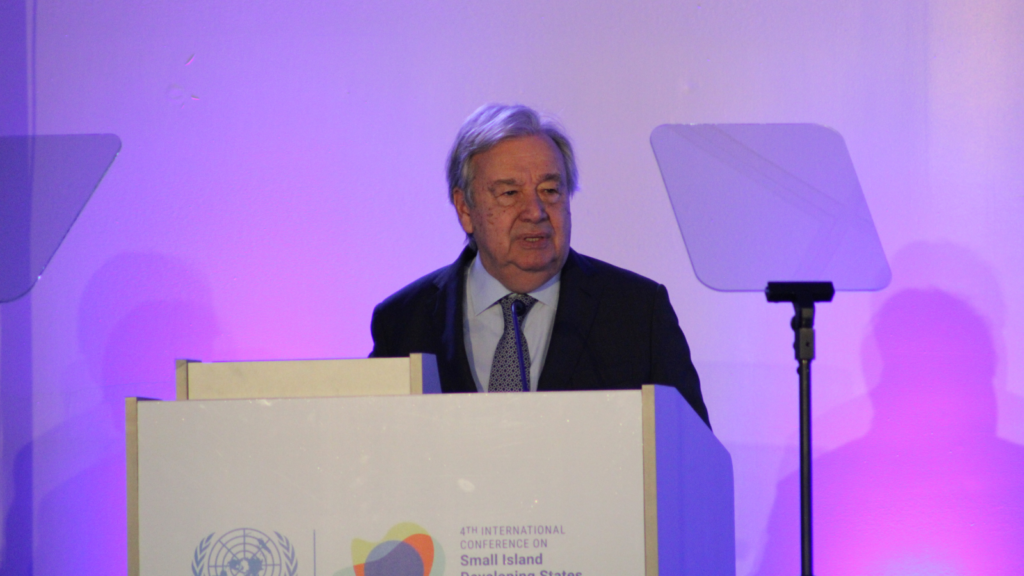United Nations Secretary-General Antonio Guterres called for a structural change to the international financial system, which he identified as “distorted,” so that Small Island Developing States (SIDS) can access the resources they need to address their challenges.
Guterres made this call during a discussion on the “Call to Action and Bridgetown 3.0” during the Fourth International Conference on Small Island Developing States (SIDS4) in Antigua and Barbuda.
“There is a structural change that needs to be made in the international financial system to make it correspond to today’s economy and not to the economy after the Second World War,” he said.

For many years, leaders of SIDS have complained about the unfair methods used in the international financial system that blacklists SIDS and prevents them from qualifying for grants and concessionary loans.
According to Guterres, several practical solutions can be implemented to fix the situation. Still, entities need to accept and have the political will to change and bureaucracies should recognize that the present procedures need to be changed.
He said one of the changes is that every country cannot be treated equally.
“You cannot have the same methodology to deal with the problems of Argentina and the problems of small islands,” Guterres noted.
“I made to the IMF a proposal several times that you need to have a program for small islands that will address the problems like 20, 25 or many that are in need in a way that is simplified, that is across the board, that will solve, all of a sudden, the problems of a large number of countries that will never be able to solve country by country with the same methodology that we use for big countries.
“I think that there is a cultural change, a structural change, but a cultural change that is needed for the system to respond to the needs of the SIDS.”
The UN secretary general pointed out that SIDS have a structural negative handicap of competitiveness in today’s global economy.
“Now, they (SIDS) were able to respond to debt with innovation in several areas, but it was essentially tourism and then came COVID, and with COVID tourism was not there, so they had to borrow money,” Guterres explained. “Then, when the money was borrowed, they couldn’t print money like others, but because of the money that was printed and because of the war in Ukraine, prices went up, interest rates went up, the money that was borrowed, now it’s much more expensive.”
To make SIDS even more complicated, the instruments that exist to address this problem are insufficient.
“All of the proposals that were made until now, in the different meetings, what I’ve seen is that there has been no political will to make the structural changes that are necessary for the system to work and then address the challenge of the Small Island Developing States. The system is too small,” Guterres said.
“There is not enough capital in the financial system to respond to these challenges. Not only is the system small, but the system is distorted in its priorities. So the combination of these two factors makes the access of SIDS to the resources they need very difficult.
“It reminds me of a training of a cat to catch a mouse. You can do excellent things to improve the capacity of a cat to catch a mouse, but that works will not transform a cat into a tiger, what we need today is a tiger because it is not a mouse that we are trying to catch, a huge antelope, because the problem is much bigger than the capacity of the system to address the problem.”
Leaders of SIDS in the Caribbean have been meeting regularly concerning this issue.
In an interview with Prime Minister Philip Davis at the SIDS4 conference in Antigua and Barbuda, he told The Bahama Journal that Caribbean leaders have been very strong in advocating for changes in the financial architecture to ensure that SIDS, like The Bahamas, could have access to concessionary financing and grants.
“The protocol for accessing grants and concessionary loans excludes a lot of the Small Island Developing States because the criteria used do not take into account our vulnerability,” Davis said.
“For example, The Bahamas, spread over 100,000 square miles, with more than 80% of our land mass less than three meters above sea level, we’re an extremely vulnerable state for rising seas. When you consider that and recognize the consequence of climate change is rising sea levels, when you also think about the fact that most of our land mass is made out of porous limestone, it also means that instead of coming over us, it comes through us and under us, and so we are particularly vulnerable and we can’t do it alone. We have to join the voices of those who are facing similar challenges and we have to combine and collaborate to get responses from the Global North.
“Particularly, as you have been hearing during this morning’s session, this is not a challenge brought on by ourselves. It’s a challenge brought on by the industrial world, which is made up primarily of those in the Global North and they still have not become accountable. Yes, they recognize the challenge, yes they acknowledge the challenge, but yet still they only paying lip-service to respond to those challenges as to impact us.”
Davis emphasized that the SIDS4 conference is the forum where leaders can identify these issues, bring them to the fore and try to make accountable those responsible for the challenges SIDS face today.
—
This story was originally published by the Bahama Journal and is re-published with permission. It was written by Deandre Williamson, an alum fellow of our Caribbean Climate Justice Journalism Fellowship.